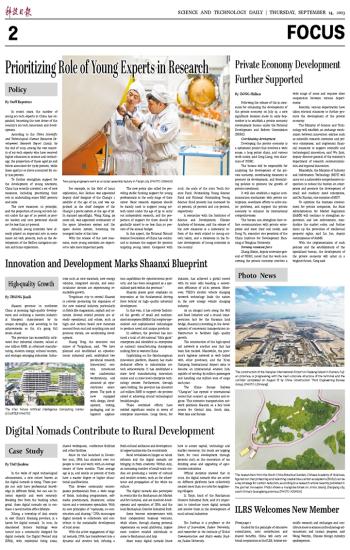
In the wake of rapid technological advancement, a new cohort known as the digital nomads is rising. These people not only have professional knowledge in different fields, but can use Internet expertly and work remotely. Breaking free from the bustling urban grind, these digital nomads opt to embrace a novel mobile office lifestyle.
Xilong, a township of Anji county in east China's Zhejiang province, is a haven for digital nomads. In 2021, its abandoned factory buildings were turned into a community designed for digital nomads, the Digital Nomad Anji (DNA), with residential living areas, shared workspaces, conference facilities and other facilities.
Since its trial launched in December 2021, DNA has attracted over 700 people to live and work, with an average tenure of three months. Their average age is 31, and nearly 40 percent of them have a master degree or higher educational qualifications.
This diverse community encompasses professionals from a wide range of fields, including programmers, self-media practitioners, illustrators, online tutors and e-commerce specialists. With its core principles of "openness, co-construction and sharing," DNA encourages digital nomads to collaborate and contribute to the sustainable development of rural areas.
With the active engagement of digital nomads, DNA has transformed into a dynamic and creative hub, infusing a fresh cultural ambiance and developmental opportunities into the countryside.
Rural revitalization hinges on talent infusion and the digital nomads are bringing in fresh creativity. Within Anji, an increasing number of small-scale studios are producing a variety of cultural and creative content, such as the inheritance and propagation of the white tea culture.
The digital nomads also participate in events like the Baichayuan Art Market and Pet Carnival, and are involved development and operation of DNA and the local Baichayuan Creative Industrial Park.
Some become entrepreneurs with their independent business ventures, while others, through sharing personal experiences on social platforms, inspire more creative-minded individuals to come to Baichayuan and Anji.
Since many digital nomads know how to access capital, technology and market resources, the locals are tapping them for rural development through projects such as the renovation of tea drinking areas and upgrading of agro-tourism industries.
Official statistics showed that in 2022, the digital nomads who are active on different platforms have collectively created more than 200 jobs for neighboring villagers.
Li Yanyi, head of the Baichayuan Creative Industrial Park, said it's important to introduce more digital nomads and involve them in the development of rural cultural industries.
Yao Jianhua is a professor at the School of Journalism, Fudan University, and researcher at the Institute of Global Communication and Multi-media Studies, Fudan University.


 Next
Next




